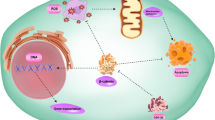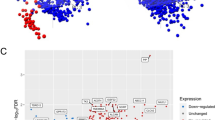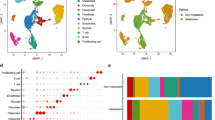Abstract
Purpose
In our previous study, Developmental endothelial locus-1 (Del-1) was a promising predictive marker for breast cancer. However, the downstream targets of Del-1 remain unknown. Here, we sought to discover a druggable target downstream of Del-1 and investigate the mechanism by which it regulates the course of breast cancer.
Methods
To investigate Del-1 downregulation effect on breast cancer, we performed transcriptome analysis using RNA sequencing of Del-1 knockdowned MDA-MB-231 cell line Plus, to investigate the expression of Del-1 and Maternal embryonic leucine zipper kinase (MELK), mRNA levels in eight different triple-Negative Breast Cancer (TNBC) cell lines were analyzed. High-throughput sequencing was performed on total RNA isolated. OTS167 was used for MELK inhibition. The effects of MELK on cell proliferation and invasion were determined using the MTT and Matrigel transwell assays. Furthermore, we examined MELK expression in breast cancer tissue.
Results
Del-1 and MELK mRNA expression levels were significantly higher in the TNBC cell lines, MDA-MB-468, HCC-1806, and MBA-MB-231. Knocking down Del-1 with siRNA in HCC-1806 and MBA-MB-231 cells significantly decreased MELK expression and thus suggested a possible relationship between Del-1 and MELK. In MDA-MB-468 cells, a basal-like 1 TNBC cell line, OTS167 significantly inhibited breast cancer cell proliferation and promoted cell apoptosis. To further investigate the relationship between Del-1 and MELK, dual inhibition of both Del-1 and MELK was performed, which significantly reduced the viability of MDA-MB-468 and MBA-MB-231 cells.
Conclusion
We found that MELK acts downstream of Del-1 and is a promising druggable target, especially in basal-like and mesenchymal stem-like subtype.





Similar content being viewed by others
Data availability
The data presented in this study are available on request from the corresponding author. The data are not publicly available due to privacy.
References
Yin L, Duan JJ, Bian XW, Yu SC (2020) Triple-negative breast cancer molecular subtyping and treatment progress. Breast Cancer Res 22(1):61
Anders CK, Carey LA (2009) Biology, metastatic patterns, and treatment of patients with triple-negative breast cancer. Clin Breast Cancer 9(Suppl 2):S73-81
Ho HK, Jang JJ, Kaji S et al (2004) Developmental endothelial locus-1 (Del-1), a novel angiogenic protein: its role in ischemia. Circulation 109(10):1314–1319
Beckham CJ, Olsen J, Yin PN et al (2014) Bladder cancer exosomes contain EDIL-3/Del1 and facilitate cancer progression. J Urol 192(2):583–592
Xia H, Chen J, Shi M et al (2015) EDIL3 is a novel regulator of epithelial-mesenchymal transition controlling early recurrence of hepatocellular carcinoma. J Hepatol 63(4):863–873
Lee SJ, Jeong JH, Lee J et al (2021) MicroRNA-496 inhibits triple negative breast cancer cell proliferation by targeting Del-1. Medicine 100(14):e25270
Watanabe T, Kobunai T, Yamamoto Y et al (2011) Predicting ulcerative colitis-associated colorectal cancer using reverse-transcription polymerase chain reaction analysis. Clin Colorectal Cancer 10(2):134–141
Moon PG, Lee JE, Cho YE et al (2016) Identification of developmental endothelial Locus-1 on circulating extracellular vesicles as a novel biomarker for early breast cancer detection. Clin Cancer Res 22(7):1757–1766
Lee SJ, Lee J, Kim WW et al (2018) Del-1 expression as a potential biomarker in triple-negative early breast cancer. Oncology 94(4):243–256
Chung S, Suzuki H, Miyamoto T et al (2012) Development of an orally-administrative MELK-targeting inhibitor that suppresses the growth of various types of human cancer. Oncotarget 3(12):1629–1640
Jiang P, Zhang D (2013) Maternal embryonic leucine zipper kinase (MELK): a novel regulator in cell cycle control, embryonic development, and cancer. Int J Mol Sci 14(11):21551–21560
Janostiak R, Rauniyar N, Lam TT et al (2017) MELK promotes melanoma growth by stimulating the NF-κB pathway. Cell Rep 21(10):2829–2841
Ikeda Y, Sato S, Yabuno A et al (2020) High expression of maternal embryonic leucine-zipper kinase (MELK) impacts clinical outcomes in patients with ovarian cancer and its inhibition suppresses ovarian cancer cells growth ex vivo. J Gynecol Oncol 31(6):e93
Li G, Yang M, Zuo L, Wang MX (2018) MELK as a potential target to control cell proliferation in triple-negative breast cancer MDA-MB-231 cells. Oncol Lett 15(6):9934–9940
Tang Q, Li W, Zheng X et al (2020) MELK is an oncogenic kinase essential for metastasis, mitotic progression, and programmed death in lung carcinoma. Signal Transduct Target Ther 5(1):279
Xia H, Kong SN, Chen J et al (2016) MELK is an oncogenic kinase essential for early hepatocellular carcinoma recurrence. Cancer Lett 383(1):85–93
Zhang H, Wei P, Lv W et al (2019) MELK is upregulated in advanced clear cell renal cell carcinoma and promotes disease progression by phosphorylating PRAS40. Cell Transpl 28(1):37s–50s
Funding
This work was supported by a grant of the Korea Health Technology R&D Project through the Korea Health Industry Development Institute (KHIDI), funded by the Ministry of Health & Welfare, Republic of Korea (Grant Number: HR22C1832). This work was supported by Basic Science Research Program through the National Research Foundation of Korea (NRF) funded by the Ministry of Education (NRF-2022R1I1A1A01070224). This work was supported by the National Research Foundation of Korea (NRF) grant funded by the Korea government (2022R1F1A1072458).
Author information
Authors and Affiliations
Contributions
YSC and SJL contributed to the study conception and design. Material preparation and data collection were performed by BK, JL and JHJ, JYP, NJYP, and HYP. The analysis was performed by IHL, EAK and JK. The first draft of the manuscript was written by IHL and all authors commented on previous versions of the manuscript. All authors read and approved the final manuscript.
Corresponding author
Ethics declarations
Conflict of interest
The authors declare that they have no conflicts of interest.
Ethical approval
The study was conducted according to the guidelines of the ethical standards of the institutional research committee and with the 1964 Helsinki declaration and its later amendments. This study was approved by the Institutional Review Board of KNUCH (KNUCH 2020-0-025). Written informed consent was obtained from all individual participants included in the study.
Consent to participate
Informed consent was obtained from all individual participants included in the study.
Consent to publish
Not applicable.
Additional information
Publisher's Note
Springer Nature remains neutral with regard to jurisdictional claims in published maps and institutional affiliations.
Supplementary Information
Below is the link to the electronic supplementary material.
Rights and permissions
Springer Nature or its licensor (e.g. a society or other partner) holds exclusive rights to this article under a publishing agreement with the author(s) or other rightsholder(s); author self-archiving of the accepted manuscript version of this article is solely governed by the terms of such publishing agreement and applicable law.
About this article
Cite this article
Lee, I.H., Lee, S.J., Kang, B. et al. Exploration of MELK as a downstream of Del-1 and druggable targets in triple-negative breast cancer. Breast Cancer Res Treat 205, 181–191 (2024). https://doi.org/10.1007/s10549-023-07198-2
Received:
Accepted:
Published:
Issue Date:
DOI: https://doi.org/10.1007/s10549-023-07198-2




